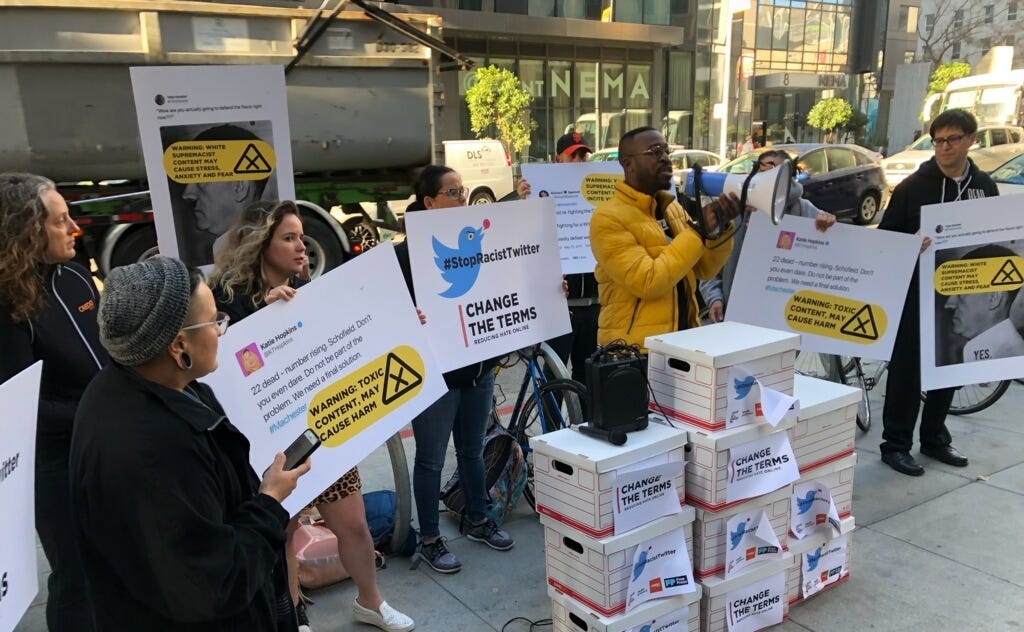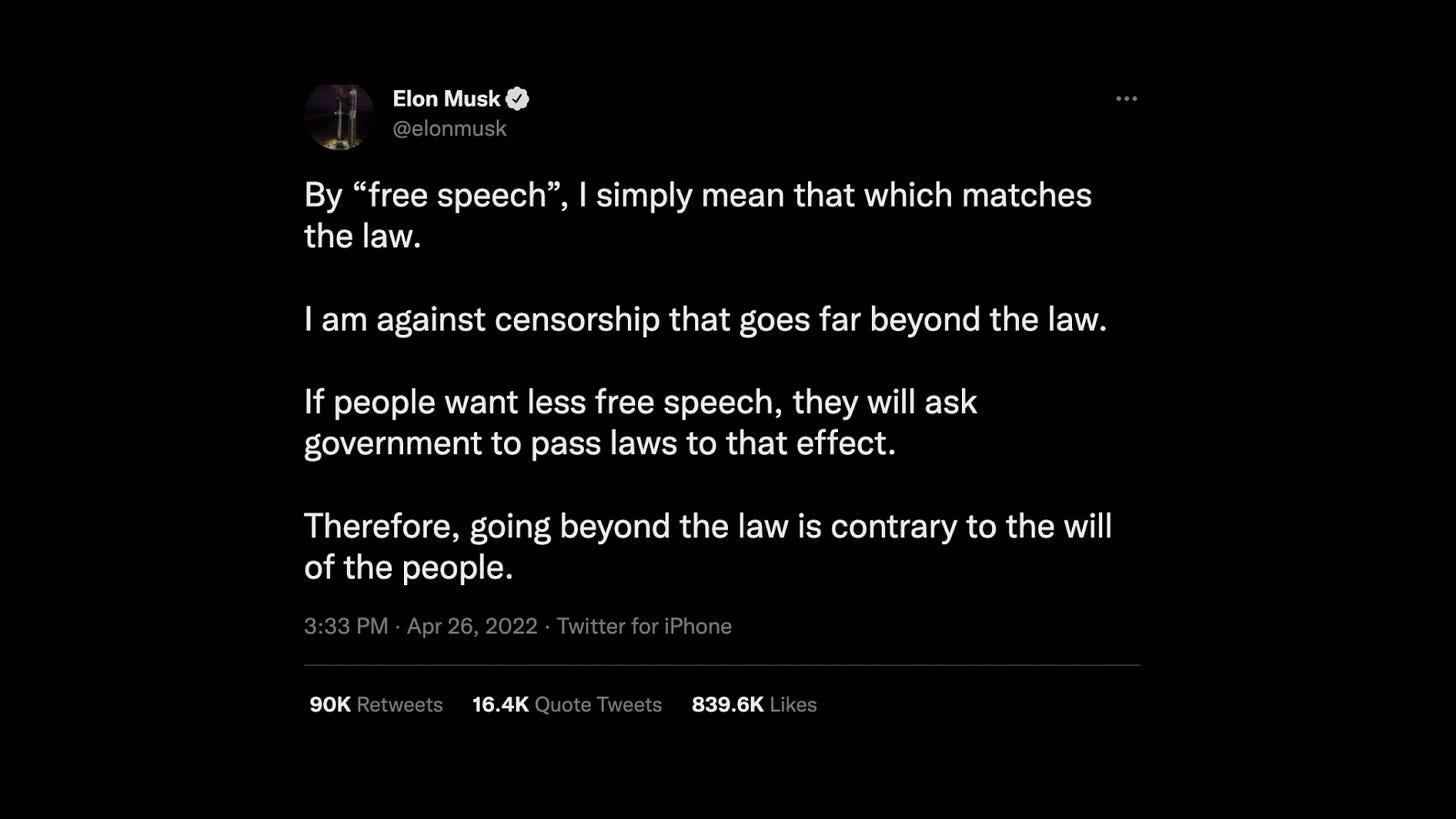Twitter, Elon, and the Challenge for Free Speech
Elon buying Twitter changes everything. Or does it?
Free speech is a topic we’ve covered several times in this newsletter.
We’ve outlined the moral case for free speech — namely that the marketplace of ideas has been necessary for every minority group to achieve civil rights, among other accomplishments.
We also described the practical challenges with the marketplace of ideas — namely that it’s rigged by the powerful who enforce The Current Thing.
In this piece we’ll discuss the technical challenges of a free speech internet. But first, let’s recap what’s happening right now.
The free speech discourse has once again resurfaced due to Elon’s potential purchase of Twitter and his intentions to introduce more free speech and less content moderation onto the platform.
Free speech is a tool to discover truth. Content moderation is a tool for engendering social cohesion. You can optimize for truth or social cohesion, but you can’t optimize for both.
Some people say “freedom of speech isn’t freedom of reach” to imply that we can have both, but that misunderstands free speech. As Antonio Garcia Martinez says, “Speech without reach isn’t free speech; it’s just mumbling to yourself.”
When people critique free speech they often attack the strawman version of the idea. They complain that “absolute free speech” will lead to chaos and harm — but the conversation isn’t about allowing absolute free speech. We have 231 years of case law that determine acceptable and unacceptable forms of speech, including harassment, slander, etc. The question isn’t ‘should we allow absolute free speech?’ The question is instead: ‘should the free speech laws that regulate our government also regulate our companies, especially if they’re increasingly becoming the public square?’
More precisely, to quote Antonio again, the real question is:
Do you think freedom of speech includes the right to say and believe obnoxious stupid shit that’s almost certainly false, or do you feel platforms have the responsibility to arbitrate truth and regulate online behavior for the sake of some supposed greater good?
If you say yes you are in Elon’s camp and on team truth. If you say no you are likely against Elon and on team social cohesion.
Other people will evade the moral question and instead focus on the legal question: Do companies have the same obligations as governments? Well, of course they don’t. Private companies do not have the same legal restrictions as governments. But we are not discussing the legal case for free speech; we’re discussing the moral case. Not what Twitter can do, but what they should do.
Marc Andreessen emphasized this distinction in a thread (emphasis mine):
Free speech in our society is more than legalism, but an integral component of our way of life, our culture, our civilization…Incarnated *in* the Constitution, but not limited *to* the Constitution….And so, when considering demands for sweeping changes to our societal conception of free speech, I think it is prudent and wise to reflect on the 231 year evolution of the legal doctrine of free speech, rather than dismissing all of that encoded wisdom as outdated and irrelevant….And it is within that context that I find it so striking that, while First Amendment case law includes a significant number of abridgments of absolute free speech, it contains no abridgments of so-called "misinformation" or "hate speech". I don't think this is accidental.
Other people will respond with something like: ‘sure, people can speak freely, but should those same people also be exempt from any judgment in response to their speech? After all, the critics are also exercising their right to free speech!’ This question is best answered by the Russian joke: ‘In Russia we have freedom of speech. But in America you have freedom after speech!’ People who criticize or block are engaging in free speech, companies who deplatform are violating it.
Robin Hanson articulated an interesting reframe on the question of free speech: he proposes that instead of prioritizing the speaker’s right to speak, we prioritize the listener’s right to hear. When we punish someone’s right to speak, we often focus on the cost to the speaker, but there’s also a cost to all the listeners as well. This sentiment is best expressed by the Frederick Douglass quote:
To suppress speech is a double wrong. It violates the rights of the hearer as well as those of the speaker. It is just as criminal to rob a man of his right to hear and speak as it would be to rob him of his money
To be clear, this doesn’t mean that people have to listen to speech they don’t want to hear. Social networks enable you to block anyone as you please. Repurposing a quote from Compact: Just as it is normal and healthy for devout religious people to want to see only religious content, it is normal and healthy for devout progressives to want to see only progressive content. For example, say fundamentalist extremists took over Twitter and banned all non-religious content under a system of vague guidelines which purported to be objective and universal but in fact coincided perfectly with the teachings of their religious leader. This would result in Twitter ceasing to be a free platform made for all people. It would turn Twitter instead into a religious platform exclusively for religious people.
To be clear, when you block someone on Twitter, you’re not violating someone’s right to free speech. You’re only in violating of that right when you kick them off the site entirely.
Elon buying Twitter changes everything. Or does it?
The consensus opinion for many years was that Twitter should be able to ban whomever it wanted without explanation since, after all, it was a private company. Ironically though, now that Elon might own Twitter, people are expressing less excitement about that belief. Some people are very concerned.
Of course, the same people warning against an Elon-run Twitter were the same people saying “Twitter is a private company” when free speech advocates were complaining about censorship the past few years.
As Naval Ravikant once put it: “If you're intellectually honest and advocate for a system that controls people, turn over the keys to your enemies for a dry run.”
The current discourse is missing something significant: Even if Elon takes over Twitter and tries to create a true marketplace of ideas, there’s no guarantee he’ll be able to pull it off. Twitter is part of a broader censorship ecosystem that is outside of the company’s control. While social media is a significant player in the free speech game, free speech also depends on many other layers including search engines, app stores, web host providers like AWS, payment processors like Paypal, and content distribution networks like Cloudflare. If even one of those players demurs, there’s not much Elon can do.
And these players have gotten more aggressive in their censorship. Indeed, just last week, Paypal reportedly implemented a policy to fine users $2500 if they spread misinformation. While Paypal since reneged on the policy, claiming it to be a “error,” other companies such as GoFundMe have done similar things such as blocking donations to groups they deemed beyond the pale. Some of these companies have enacted coordinated bans, all teaming up to ban Parler (Yeezus!) and others within 24 hours.
But why is this problematic? Well, these technology companies have come to effectively regulate speech on the internet. These companies are unelected and unaccountable — and since they’re effectively monopolies, there’s not much users can do. The people that run these companies are largely upper class Asian/White males who vote democrat — hardly a representation of the U.S. population. They have no duty to serve anyone or anything other than their own interests, whether financial and/or political.
Elon owning Twitter is not enough. We also need more support from all layers of the internet stack, lest we have more Paypal-like censorship concerns. We can do that by promoting pro-free speech CEOs like Elon, creating decentralized versions of these companies so they “can’t be evil”, implementing standard free speech laws across these platforms, and/or boycotting companies that engage in partisan based censorship. Easier said than done, of course.
Twitter once defined itself as “the free speech wing of the free speech party.” May it forever strive to fully realize that vision, and may that same ethos spread throughout the internet.
Unfortunately, it’s far from guaranteed.
Thanks to Molly Mielke





Love this paragraph: “Free speech is a tool to discover truth. Content moderation is a tool for engendering social cohesion. You can optimize for truth or social cohesion, but you can’t optimize for both.”
But I’m more optimistic than you--I think there is an ideal system for balancing moderation with free-speech: decentralized policy.
The moment it becomes super easy for any person/company to express the kinds of content that they do and, maybe more relevant here, that they don’t want to see, the problem of content regulation can move from central decision-making to decision-making by the individuals who that content affects. Achieving that super-easy expression of content preferences is more an interface/technical/product problem than it is a governance problem.
Content-moderation, as we know it today, is the negative & centralized version of content selection more generally, which is a task that, assuming democracy as the ideal, ideally should be done by individuals for themselves & for their communities (rather than by Meta/Elon/etc)
Many others have come to this conclusion, such that it has led to a movement for a parallel economy. Gab, Dan Bongino, RightForge. We need to try and support those who have the guts to create parallel systems and platforms.